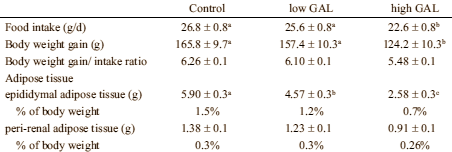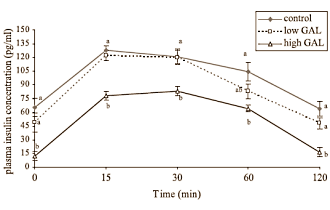Animal study: less fat with fenugreek
Studies have shown that supplementation with extracts of fenugreek ? scientific name Trigonella foenum-graecum ? result in less body fat. It's not clear how fenugreek does this, but a 2008 animal study throws some light on the matter.
Fenugreek
[TABLE="width: 358, align: right"]
[TR]
[TD="align: right"][/TD]
[/TR]
[/TABLE]
In Canada farmers discovered that they could earn money by growing fenugreek for the supplements industry. Manufacturers add extracts from fenugreek seed into products for diabetes and obesity sufferers. Fenugreek seeds are composed for about 50 percent of galactomannan: a fibrous sugar chain that changes into a gum-like substance in your stomach.Study
Studies have shown that galactomannan slows down the speed at which glucose molecules in food reach the blood. This study was set up to determine whether this was true for galactomannan in Canadian fenugreek.
The researchers gave male rats feed of which over half was sugar. A diet like that makes lab animals grossly fat. An experimental group of rats got feed which consisted for 2.5 percent of galactomannan [Low GAL], and another experimental group were given feed containing 5 percent galactomannan [high GAL]. A control group were given the sugary feed with nothing added to it [Control].
Results
After 4 weeks the Canadians examined their lab animals, and their findings are summarised in the table below.
[FONT="]
[/FONT]

[TABLE="width: 150, align: right"]
[TR]
[TD="align: right"][/TD]
[/TR]
[/TABLE]

 [FONT="]
[FONT="]
[/FONT]
The galactomannan inhibited the growth of the fat reserves, as you can see at the top. This is partly because galactomannan suppresses appetite, but that's not the whole story.
You can also see above how the animals' insulin level reacted when they were given a dose of glucose orally. The rats in the high GAL group synthesised less insulin, while glucose disappeared faster from their blood.
Mechanism
So fenugreek-seed galactomannan supplementation increases sensitivity to insulin. This may have caused the inhibitive effect on both appetite and fat reserves, the researchers speculate.
The question the study doesn't answer is: how does galactomannan increase sensitivity to insulin? By reducing glucose uptake? Or does it modulate the insulin receptor in some way?
Source:
J Clin Biochem Nutr. 2008 Nov;43(3):167-74.
Studies have shown that supplementation with extracts of fenugreek ? scientific name Trigonella foenum-graecum ? result in less body fat. It's not clear how fenugreek does this, but a 2008 animal study throws some light on the matter.
Fenugreek
[TABLE="width: 358, align: right"]
[TR]
[TD="align: right"][/TD]
[/TR]
[/TABLE]
In Canada farmers discovered that they could earn money by growing fenugreek for the supplements industry. Manufacturers add extracts from fenugreek seed into products for diabetes and obesity sufferers. Fenugreek seeds are composed for about 50 percent of galactomannan: a fibrous sugar chain that changes into a gum-like substance in your stomach.Study
Studies have shown that galactomannan slows down the speed at which glucose molecules in food reach the blood. This study was set up to determine whether this was true for galactomannan in Canadian fenugreek.
The researchers gave male rats feed of which over half was sugar. A diet like that makes lab animals grossly fat. An experimental group of rats got feed which consisted for 2.5 percent of galactomannan [Low GAL], and another experimental group were given feed containing 5 percent galactomannan [high GAL]. A control group were given the sugary feed with nothing added to it [Control].
Results
After 4 weeks the Canadians examined their lab animals, and their findings are summarised in the table below.
[FONT="]
[/FONT]

[TABLE="width: 150, align: right"]
[TR]
[TD="align: right"][/TD]
[/TR]
[/TABLE]


[/FONT]
The galactomannan inhibited the growth of the fat reserves, as you can see at the top. This is partly because galactomannan suppresses appetite, but that's not the whole story.
You can also see above how the animals' insulin level reacted when they were given a dose of glucose orally. The rats in the high GAL group synthesised less insulin, while glucose disappeared faster from their blood.
Mechanism
So fenugreek-seed galactomannan supplementation increases sensitivity to insulin. This may have caused the inhibitive effect on both appetite and fat reserves, the researchers speculate.
The question the study doesn't answer is: how does galactomannan increase sensitivity to insulin? By reducing glucose uptake? Or does it modulate the insulin receptor in some way?
Source:
J Clin Biochem Nutr. 2008 Nov;43(3):167-74.

